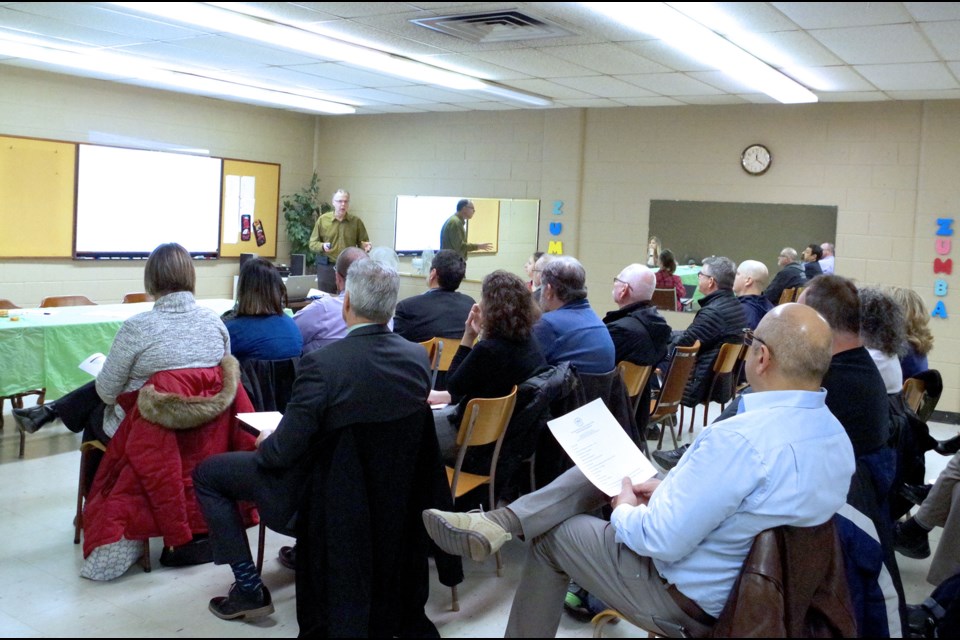Designed to divert as much waste as possible to recycling and organics, Niagara Region's next waste collection contract is set to begin in March, 2021.
Before that happens, the Region requested input on the proposed collection options being considered for the next contract.
Brad Whitelaw from the Region’s Waste Management division presented the proposed options to Thorold BIA members last week, and explained the rationale behind the proposed changes.
Simply put, less garbage would help preserve the regional landfill capacity. “It’s the right thing to do on an environmental capacity.”
Garbage “creates leaching and methane gas, which we want to keep out of the landfills.”
“Overall,” he stated, “diversion programs need to be increased. Costs will increase and we are trying to avoid that. We looked at curbside audits for industrial, commercial and institutional (IC&I) and Mixed Use (MU) properties. We are trying to standardize container units.”
The following options are being considered for base collection services as well as enhanced collection services, which includes the city litter collection:
-
Reducing the weekly (garbage only) container limits in the Downtown Business Area (DBA) from seven to four per property, as a base service.
-
Requiring the mandatory use of clear bags for both residential and business properties, with the option of allowing an opaque privacy bag to be placed inside the clear bag. According to Whitelaw, “This will lead to an increased awareness of what’s placed in the garbage, as well as revealing any potentially hazardous materials so drivers don’t get hurt.”
-
Changing the weekly garbage container limit for mixed-use properties located outside DBAs from six containers to four per property, as a base service. Garbage tags will be available for extra containers, both for residential and businesses.
-
Reducing garbage collection to every other week, with unlimited recycling and organics collected weekly for all residential and commercial sectors outside the DBA. With this option, the container limit would double, up to eight per property for IC&I properties.
Approximately 70 per cent of bigger cities in Ontario—including Barrie, Durham, Toronto, Markham, Ottawa, Peel, Vaughan and Waterloo—“have all adapted to this every-other-week service,” said Whitelaw. “This increases the diversion rates to organics and recycling. Their organics increased by 20 per cent through this program.”
“What we are trying to do is to mitigate any future cost increases. Many businesses just aren’t using the service so it’s up to each municipality whether they want to make any changes on their enhanced service level. The annual contract savings on just the garbage part has saved from $200,000 to $12 million, depending on the size of the municipality.”
The Region asked for input from all area municipalities as well as chambers and tourism agencies in the last few months. Letters were sent to businesses and household online surveys were sent out, with 6,639 responses. “Very few businesses provided feedback.”
A telephone survey of 1,200 people produced the following results: Almost three in five respondents said they “could manage the reduction from seven to four containers.”
“My only concern,” said BIA president Marsha Coppola, “is that a lot of our businesses don’t use organics. Landlords have more than one business on their property now,” meaning if there are five businesses on one property, one business owner won’t be able to put out a garbage container to meet the four-container limit.
Shannon Passero also expressed concern. “I have 11 apartments and a retail business, so if the tenants all decide to put their garbage out on the same day, it can be problematic.” A larger building “shouldn’t have the same requirements as a much smaller building.”
Regional staff replied, “There has to be more dialogue around that.”
No decisions on proposed collection options will be made until after all stakeholder consultation analysis is complete and staff report back to Regional Council in early 2019.



